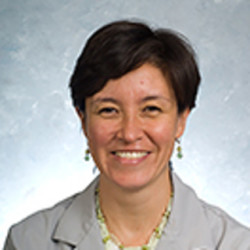I had the distinct pleasure of attending and presenting at the 45th annual San Antonio Breast Cancer Symposium (SABCS). The SABCS is a unique meeting because it brings together clinicians and researchers from all over the world to convene and discuss new treatments for breast cancer. Last year over 9,500 people attended the symposium and I expect that this year’s attendance will be even higher. I presented at the educational session titled “Local Therapy-Best Breast Practice” (see if you can say that 10 times in a row!) on "Contralateral Prophylactic Mastectomy for Germline Mutation Carriers." This topic is especially pertinent to surgeons who face discussions about contralateral prophylactic mastectomy (CPM) on a weekly basis. The decision to undergo CPM is a personal decision that may not always be based on facts and figures. This decision is especially complex for germline mutation carriers who not only have to face a breast cancer diagnosis, but also a germline mutation that could substantially increase risk of second breast cancers and other cancers.
The increase in the use of multigene panel genetic testing has led to higher rates of positive tests for germline mutations besides BRCA1 and BRCA2. Contralateral breast cancer (CBC) risk for affected BRCA germline mutation carriers is well known. A study published in 2017 of 2, 213 BRCA carriers from England, France and the Netherlands showed a 60% CBC risk for BRCA1 carriers if their first breast cancer was diagnosed prior to 40 years old versus a 38% risk if diagnosed after 50 years old; these numbers were 68% and 20% respectively for BRCA2 carriers (Kuchbaeker et al, JAMA 2017; 317:2402). However, CBC risk for patients for other germline mutation carriers is unknown. In 2021 I was part of a study (JNCI Cancer Spectrum 2021) that examined gene associations with second breast cancers using an Ambry Genetics clinical database. We found that 7.8% of women with one breast cancer tested positive for pathogenic/likely pathogenic variants compared to 11.1% of women who had a second breast cancer(p<0.001). Among Caucasians, exclusive of Ashkenazi Jewish women, those carrying a pathogenic/likely pathogenic variant in a clinically actionable gene were 1.44 (95% confidence interval [CI] = 1.30 to 1.60) times as likely to have second breast cancer than noncarriers, after accounting for potential confounders such as age, family history of breast cancer, tumor histology and prior BRCA testing. Among African American and Hispanic women, a pathogenic/likely pathogenic variant in a clinically actionable gene was 1.88 (95% CI = 1.36 to 2.56) and 1.66 (9% CI = 1.02 to 2.58) times as likely to be associated with a second breast cancer, respectively (P < .001 and P = 0.03). Amongst those patients whose second breast cancers were in the contralateral breast, BRCA1, BRCA2, CHEK2, TP53 and PALB2 were significantly associated with a CBC but ATM was not. Likewise, Yadov et al examined CBC risk in the Cancer Risk Estimates Related to Susceptibility (CARRIERS) study which was presented at the SABCS on Friday December 9, 2022. The CARRIERS study is a consortium of 10 prospective epidemiological studies in the United States that followed 15,104 women with ipsilateral invasive breast over an 11 year period. These women underwent genetic testing of which 4.3% tested positive for a breast related pathogenic variant. The mean age of the women was 62 years old. Compared to noncarriers who had a 4.3% 10 yr cumulative incidence of CBC, BRCA1 carriers had a 23% 10 yr cumulative incidence of CBC, BRCA2 carriers a 17% incidence, CHEK2 carriers a 8% incidence and ATM carriers a 4.0% incidence. Overall PALB2 carriers had a 7.9% incidence but PALB2 carriers with estrogen receptor negative breast cancer had a 19.7% incidence of CBC. Patient’s age was strongly associated with CBC risk; of 6,010 women who were greater then 65 years old at their first breast cancer diagnosis, only three developed CBC over a 10 year follow up period. Additionally, African American BRCA1 and BRCA2 carriers were at similar increased risk for CBC as non-Hispanic white women.
These two studies represent the largest recent studies to examine CBC risk in affected germline mutation carriers. The two studies show similar findings, BRCA1, BRCA2, CHEK2 and some PALB2 mutation carriers are at increased risk of CBC but ATM carriers are not necessarily at increased risk of CBC. These increased CBC risks are seen in African Americans at the same rates as non-Hispanic white women. These studies provide valuable data that was previously nonexistent. And this is what I love about the SABCS, access to new knowledge that I can translate to clinical decisions the minute I walk back into my clinic. It will be interesting to see future studies on this topic to understand what other factors may influence CBC risk in patients with germline mutations such as prophylactic oophorectomy or the effect of endocrine therapy.
Dr. Yao has no conflicts of interest to report.
Image by GoodStudio / Shutterstock







